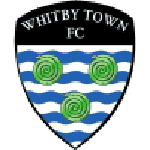| Coach | NA |
| Venue | Turnbull Ground |
Whitby Town predictions
Predictions for Whitby Town: See upcoming and historic predictions for Whitby Town below.
Disclaimer: Past performance does not guarantee future results. Betting involves risk; only wager what you can afford to lose. Always gamble responsibly.
Whitby Town latest results
| 30/09 | 1 - 0 | ||
| 16/09 | 2 - 1 | ||
| 01/09 | 0 - 6 |
About Whitby Town
Whitby Town Football Club is a semi-professional football club based in the seaside town of Whitby, North Yorkshire, England. Founded in 1880, the club has a rich history spanning over a century, making it one of the oldest football clubs in the country.
The club plays its home games at the Turnbull Ground, which has a capacity of 3,500. The ground is named after Ernest Turnbull, a local businessman who donated the land to the club in the early 20th century. The club's colours are blue and white, reflecting the town's maritime heritage.
Whitby Town has spent the majority of its history in the Northern Premier League, an English football league that forms part of the National League System. The club has had several successful seasons in this league, including a memorable campaign in 1996-97 when they won the FA Vase, a competition for teams playing below the Football League.
Despite being a small club, Whitby Town has produced several notable players who have gone on to have successful careers in the Football League and beyond. These include Graeme Armstrong, a prolific striker who later played for Darlington, and Lee Bullock, a midfielder who went on to play for Cardiff City and Bradford City.
Whitby Town is a community-focused club, with strong ties to the local area. The club runs a successful youth system, providing opportunities for young players in the region to develop their skills and potentially progress to the first team. The club also organises a range of community initiatives, including football coaching sessions in local schools and fundraising events for local charities.
Despite the challenges of being a semi-professional club in a small town, Whitby Town has a dedicated fan base. The club's supporters are known for their passionate and vocal support, creating a lively atmosphere at home games. The club also has a supporters' club, which organises social events and away travel for fans.
In recent years, Whitby Town has faced financial challenges, as have many non-league clubs. However, the club has shown resilience and determination, continuing to compete at a high level and remaining an important part of the local community. The club's ambition is to continue to develop both on and off the pitch, with the aim of progressing up the football pyramid and bringing success to the town of Whitby.
In conclusion, Whitby Town Football Club is a historic and community-driven club that has made a significant contribution to English football. Despite its small size, the club has a proud history and a bright future, with a dedicated fan base and a strong commitment to developing local talent.
















